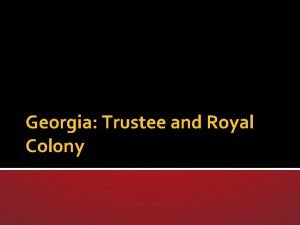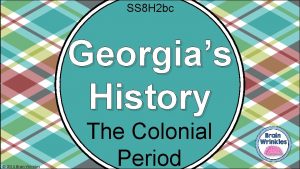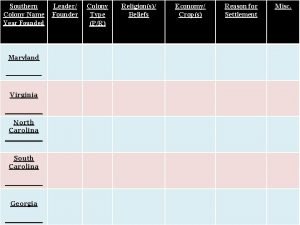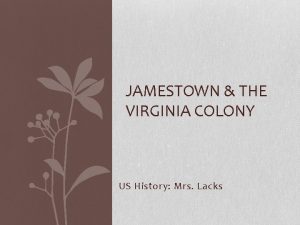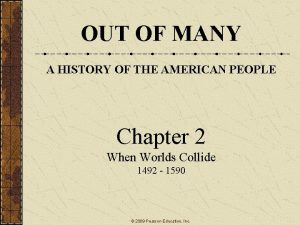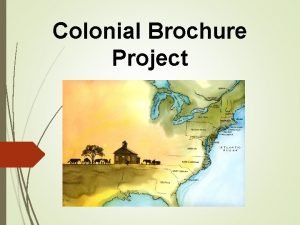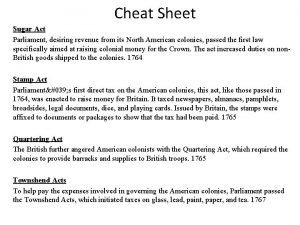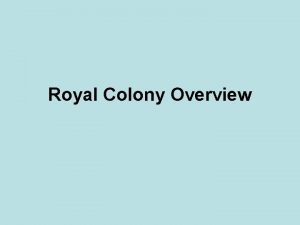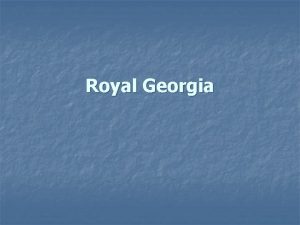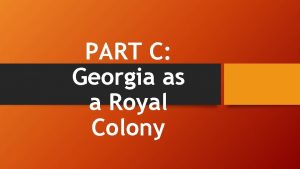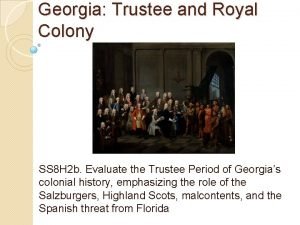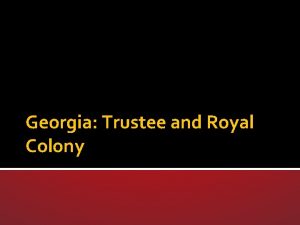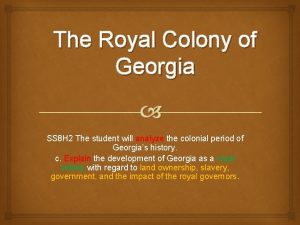The Royal Colony of Georgia SS 8 H










- Slides: 10

The Royal Colony of Georgia SS 8 H 2 The student will analyze the colonial period of Georgia’s history. c. Explain the development of Georgia as a royal colony with regard to land ownership, slavery, government, and the impact of the royal governors.

Proprietary Colony – a colony that was governed by a board of trustees. Ex: Georgia was a proprietary colony from 1732 – 1752. Royal Colony – a colony directly governed by the King. Ex: Georgia became a royal colony when the trustees ended their charter with the King in 1752 and remained that way until the end of the Revolutionary War in 1783.

The End of the Trustee Period 1732 -1752 1742 – Rum is allowed in the colony 1743 Oglethorpe returns to England, never to return to the Georgia colony. 1750 – Regulation against slavery is repealed and land restrictions lifted. 1752 – one year before the charter’s end, the trustees return Georgia to King George II

Governor John Reynolds 1754 - 1757 Arrived in Georgia on October 1, 1754— colonists cheered at his arrival Introduced the idea of self-government: wanted the colonists to help run the government Set up a court system: Court of Conscience

Government in the Royal Colony n Bicameral (two chamber) legislature was set up to represent the 8 parishes of the colony n n Lower house: Commons House of Assembly n n Those wishing to join the Assembly had to own at least 500 acres of land Upper house: Governor’s Council n n Parish: a British government district King of England appointed members of the Governor’s Council New government met for the 1 st time in 1755 in Savannah n n n reorganized state militia passed bills to build/repair roads drew up codes to restrict the rights of slaves

Court System in the Royal Colony n Court of Conscience: presided over by a local justice of the peace n n When colonists had complaints, they would go before this court Cases that could not be settled went to the Governor’s Council

Reynolds' downfall Reynolds dissolved the legislature when he felt threatened that they would undermine his authority Without the legislature, Reynolds attempted to run the government himself, making the colonists angry Angry colonists (including a large land-holder) wrote to King George complaining about Reynolds actions. He relinquished control of Georgia to Henry Ellis in 1757 King George II—in a Royal Colony, the King has ultimate control

Henry Ellis 1757 - 1759 n n n Took control after Reynolds n Learned quickly from Reynolds’ mistakes Brought people together from many different political groups n Population almost doubled under his term: 1759— population was about 10, 000 including 3, 600 slaves Colony made several economic gains n profitable farms n more merchants with a greater variety of goods n This allowed colonists to buy things they could not grow or manufacture (cloth, sugar, farming tools, seeds for planting) n Left office after becoming ill in 1760

James Wright 17601781 n n 3 rd Royal governor Born in S. C. (was the previous S. C. Attorney General Loyal to the King, but wanted the colonies to prosper Believed that Georgia would continue to grow if: n n n large farms were bigger, land ownership increased trading expanded western lands of the colony were opened to settlers Completed the defenses around Savannah with palisades and strengthened area forts. Sunbury became the official port. Courtesy of Hargrett Rare Book and Manuscript Library, University of Georgia Libraries

Georgia Crackers People from Virginia and the Carolinas settled into middle and western parts of the colony Plantation owners viewed them as “undesirable people” Soon, these lower class peoples were called “crackers, ” which was meant as an insult Crackers were not welcome and thought of as ones who did not obey the colony’s laws “Poor white trash”
 Who governed the royal colony of georgia?
Who governed the royal colony of georgia? Compare and contrast trustee and royal georgia
Compare and contrast trustee and royal georgia Similarities between trustee and royal colony
Similarities between trustee and royal colony Compare and contrast trustee period and royal colony
Compare and contrast trustee period and royal colony Southern colony religion
Southern colony religion Virginia colony
Virginia colony The lost colony of roanoke
The lost colony of roanoke Roanoke colony
Roanoke colony Colony brochure project
Colony brochure project For crown or colony cheat sheet
For crown or colony cheat sheet I winner bowling machine
I winner bowling machine


